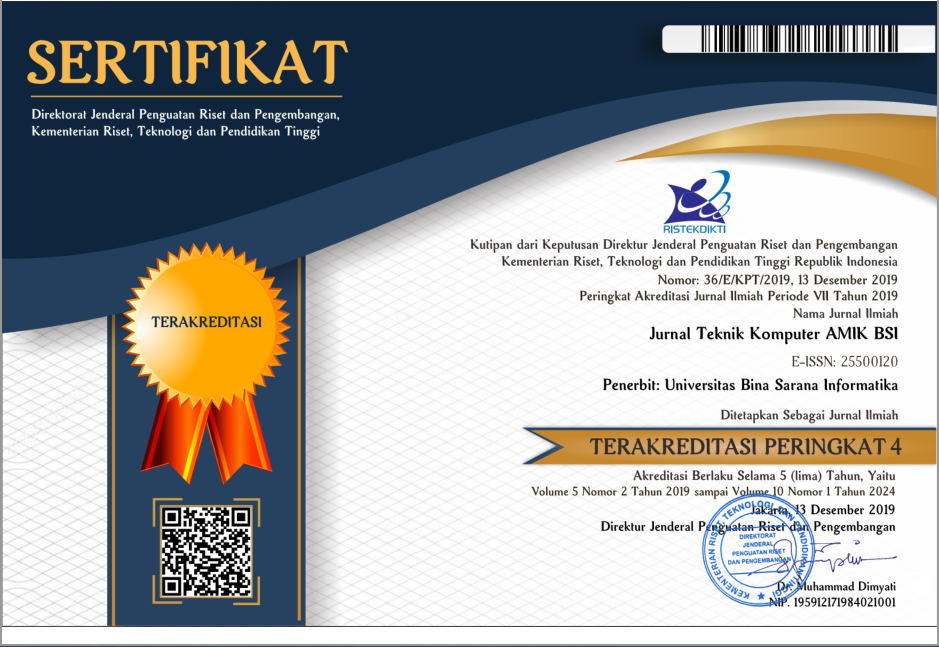Analisis Sentimen Produk Amazon Menggunakan Algoritma Naïve Bayes Pada Data Review Pelanggan
Abstract
Banyaknya data yang tersebar di internet dapat diolah untuk berbagai kepentingan baik untuk bisnis, sekolah, politik dan lainnya. Dan peningkatan teknologi juga berdampak kepasar produksi. Dari banyaknya e-comerce yang muncul dari berbagai negara dengan penggunaan yang relative mudah dan efficient. Yang membuat pelanggan tidak harus datang langsung ke toko dari produk yang ingin dibeli. Produk-produk yang dijual di e-comerce juga sangat variatif dan lengkap. Pelanggan juga dapat membeli barang yang dijual di toko luar negeri dengan sekali klik maka barang akan sampai kerumah. Salah satu e-comerce terbesar dan dapat dijangkau dari tiap-tiap negara yang berbeda adalah Amazon. Amazon menyediakan lebih dari miliaran produk dan di akses banyak pengguna setiap harinya. Maka dengan banyaknya persaingan toko dan produk di Amazon maka pembeli harus dapat menilai produk tidak hanya dari deskripsi dan foto yang disediakan toko tetapi juga harus melihat ulasan yang diberikan pembeli yang telah lebih dulu membeli barang tersebut dan seberapa banyak barang itu telah dibeli. Data review amazon yang digunakan ada 60.888 dan setelah dibersihkan dan dibuang kalimat duplikat maka data bersihnya ada 43.126 data. Dengan data sentiment positif sebesar 32318 data, negative 7.478 data dan neutral 3.330 data dengan tingkat akurasi menggunakan metode naïve bayes yaitu sebesar 100%.
The abundance of data available on the internet can be processed for various purposes, including business, education, politics, and more. Technological advancements have also impacted the production market. With the emergence of numerous e-commerce platforms from different countries, the ease of use and efficiency have increased. This eliminates the need for customers to physically visit stores to purchase desired products. The products available on e-commerce platforms are diverse and comprehensive. Customers can even buy items sold by overseas stores with just a click, and the goods will be delivered to their doorstep. One of the largest and globally accessible e-commerce platforms is Amazon. Amazon offers billions of products and is accessed by a large number of users every day. Due to the intense competition among stores and products on Amazon, buyers need to evaluate products not only based on the store's description and photos but also by considering reviews from previous customers who have purchased the same item, as well as the quantity of items sold. The dataset used for this analysis consists of 60,888 Amazon reviews. After cleaning the data and removing duplicate sentences, the clean dataset consists of 43,126 records. The dataset is further categorized into positive sentiment (32,318 records), negative sentiment (7,478 records), and neutral sentiment (3,330 records) and the accuracy rate achieved using the Naïve Bayes method is 100%.
Keywords
Full Text:
PDFReferences
Act Exchange. (2020). AMAZON.COM, INC. 2020. https://www.sec.gov/ix?doc=/Archives/edgar/data/1018724/000101872421000004/amzn-20201231.htm
Berrar, D. (2018). Bayes’ theorem and naive bayes classifier. Encyclopedia of Bioinformatics and Computational Biology: ABC of Bioinformatics, 1–3, 403–412. https://doi.org/10.1016/B978-0-12-809633-8.20473-1
Catal, C., & Nangir, M. (2017). A sentiment classification model based on multiple classifiers. Applied Soft Computing Journal, 50. https://doi.org/10.1016/j.asoc.2016.11.022
Clinten, B. (2021). Sejarah Amazon, Toko Buku Online yang Berubah Jadi Raksasa Marketplace. Kompas.Com. https://tekno.kompas.com/read/2021/05/05/20210037/sejarah-amazon-toko-buku-online-yang-berubah-jadi-raksasa-marketplace?page=all
Darwis, D., Siskawati, N., & Abidin, Z. (2021). Penerapan Algoritma Naive Bayes untuk Analisis Sentimen Review Data Twitter BMKG Nasional. 15(1), 131–145.
Foo, L. K., Chua, S. L., & Ibrahim, N. (2022). Attribute weighted naïve bayes classifier. Computers, Materials and Continua, 71(1). https://doi.org/10.32604/cmc.2022.022011
Hariguna, T., Baihaqi, W. M., & Nurwanti, A. (2019). Sentiment Analysis of Product Reviews as A Customer Recommendation Using the Naive Bayes Classifier Algorithm. IJIIS: International Journal of Informatics and Information Systems, 2(2). https://doi.org/10.47738/ijiis.v2i2.13
Sánchez-Franco, M. J., Navarro-García, A., & Rondán-Cataluña, F. J. (2019). A naive Bayes strategy for classifying customer satisfaction: A study based on online reviews of hospitality services. Journal of Business Research, 101. https://doi.org/10.1016/j.jbusres.2018.12.051
Sihombing, L. O., Hannie, H., & Dermawan, B. A. (2021). Sentimen Analisis Customer Review Produk Shopee Indonesia Menggunakan Algortima Naïve Bayes Classifier. Edumatic: Jurnal Pendidikan Informatika, 5(2), 233–242. https://doi.org/10.29408/edumatic.v5i2.4089
Trivusi. (2022). Pengertian dan Contoh Algoritma Naive Bayes Classifier. Trivusi.Com. https://www.trivusi.web.id/2022/07/algoritma-naive-bayes.html
Xu, S. (2018). Bayesian Naïve Bayes classifiers to text classification. Journal of Information Science, 44(1). https://doi.org/10.1177/0165551516677946
DOI: https://doi.org/10.31294/jtk.v10i1.19093
Copyright (c) 2024 Jesica Yolanda Br. Sibarani, Agus Junaidi, Mochammad Abdul Azis

This work is licensed under a Creative Commons Attribution-ShareAlike 4.0 International License.
ISSN: 2442-2436 (print), and 2550-0120











